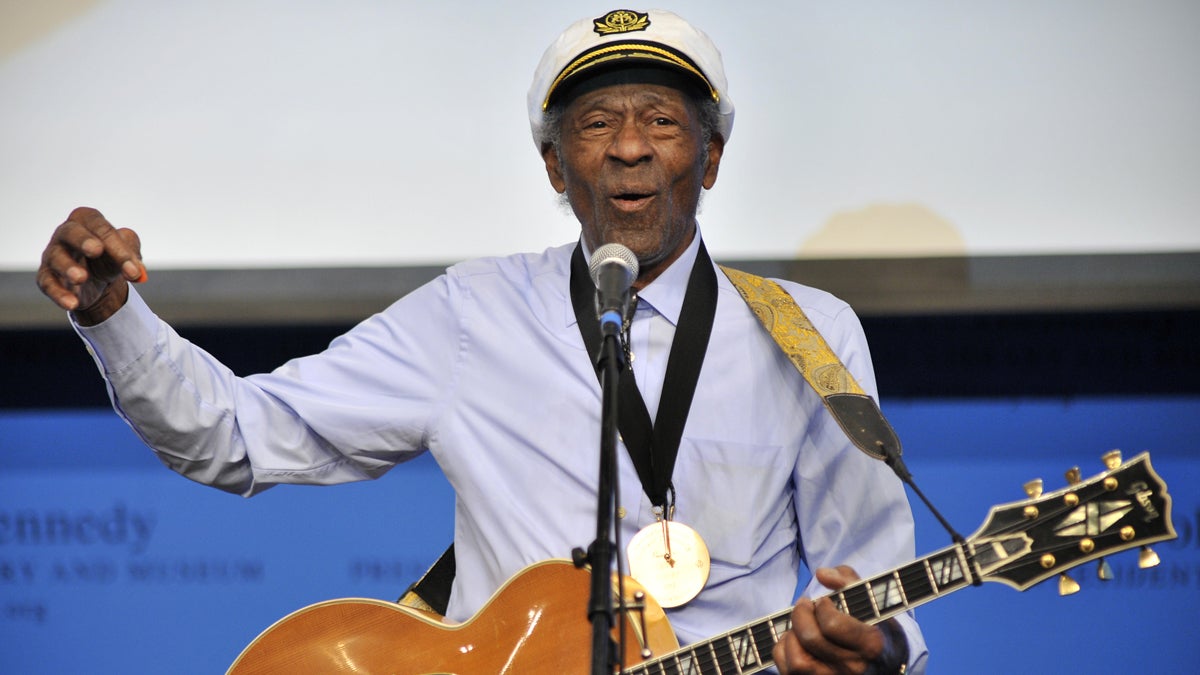In remembering Chuck Berry, we have to play both sides of his record

This Feb. 26, 2012 file photo, musician Chuck Berry plays "Johnny B. Goode" at the John F. Kennedy Presidential Library and Museum in Boston. Berry will be honored this fall by the Rock and Roll Hall of Fame as part of its American Music Masters series. (AP Photo/Josh Reynolds, File)
When a loved one dies, the last thing we want to do is dwell on the unsavory aspects of their lives. Death, above all else, is supposed to be a dignified exit.
When a loved one dies, the last thing we want to do is dwell on the unsavory aspects of their lives. Drinking problems, extramarital trysts, and explosive tempers take a back seat to the way we want to remember them: as good, God-fearing people who taught us valuable life lessons, saved cats stuck in trees, and helped elderly women cross the street. Death, above all else, is supposed to be a dignified exit.
Few deaths could bring about as much recorded heartache as the recent passing of Chuck Berry, the Father of Rock and Roll. The news inspired countless tributes from living rock legends and fans alike from around the world on social media. To Bruce Springsteen, he was “rock’s greatest practitioner.” The Rolling Stones referred to him as “a massive influence.” On Instagram, Philly native Questlove shared a picture of Berry at the Rock & Roll Hall of Fame with the words “Thou Shall Have No Other Rock Gods Before Him.”
Thou Shall Have No Other Rock Gods Before Him #ChuckBerry rip
Certain aspects of Berry’s life that were omitted from individual remembrances on social media were given a sentence or two in the lengthy obituaries that were published by the New York Times, Rolling Stone, and CNN. In the same lifetime that he made monumental contributions to music, Berry was convicted of trafficking a 14-year-old girl across state lines in 1959 and settled lawsuits filed against him in 1990 by several women he secretly videotaped in the ladies room of his restaurant in St. Louis.
These revelations, unknown to me until I read about them online in the days after Berry died, have tested my loyalties as a Chuck Berry fan and an advocate for survivors of sexual assault. Can I honor a man’s legacy while holding him accountable for his crimes against women? In the age of social media, when very little is allowed to be forgotten, we have to find a common ground when it comes to remembering the life of Chuck Berry, both for the fans that are mourning a legend and the survivors who are coping with renewed trauma.
Sins of the Father of Rock ‘n’ Roll
It’s easy to forget that Chuck Berry is human like the rest of us. Born in 1926, he grew up in a segregated middle-class neighborhood and got into trouble during his teens for stealing cars and committing armed robberies. Music became his salvation, and it was his musical talents that would lead him out of the dismal future guaranteed to so many young black men at the time. His achievements and influence on rock music made him a hero in the black community and an icon in the music industry. He deserves to be remembered for that.
On the other hand, it’s a disservice to history, and the survivors of sexual assault and human trafficking, to sweep the unsavory aspects of this artist’s life under the rug. Janice Norine Escalanti was only 14 years old when Berry brought her on tour with him in 1959. She had an eighth grade education when she ran away from home and worked as a prostitute and a waitress to survive. According to court filings, Berry had sex with Escalanti multiple times over the course of three weeks while she traveled with him on tour.
Escalanti was also Native American, a detail worth mentioning because Native women have historically experienced disproportionately higher rates of domestic abuse and rape, usually at the hands of non-Native men. In fact, Native American women are 2.5 times more likely to be sexually assaulted or raped compared to women of any other ethnic group in the United States.
The cases involving Escalanti and the 59 women who sued Chuck Berry in 1990 for videotaping them without consent in a bathroom have become footnotes in a larger narrative. This is problematic for a couple of reasons. By not investigating this aspect of his life more thoroughly, reporters and biographers are elevating a very famous man above the concept of getting consent while also dismissing the experiences of his victims. No one is above consent, and no one should feel as though they cannot report their attack because a celebrity’s reputation trumps their rights.
Getting comfortable with the uncomfortable
A friend of mine told me recently, “You can’t listen and react at the same time.” It’s a piece of advice that is worth mentioning here, because I experienced some pretty strong emotions when I read about the stories of abuse against an artist whose music was featured prominently in the soundtrack of my childhood. Instead of dismissing the ugliness of what I read, I decided to investigate it further through research and listen to the facts.
By learning both sides of the story, I was able to understand the pain and bitterness that consumed Chuck Berry’s life after his arrest in 1959. He was behind bars when his music began to inspire the next generation of singers and songwriters in the early ’60s, including the Beach Boys, The Beatles, and the Rolling Stones. He may have beat the odds to create the sound of rock and roll, but it must have been profoundly painful to watch white artists profit off of his innovative sound while he was in jail.
When it comes to remembering an extraordinary life, we need to talk about the good and the bad. We can still love Chuck Berry and his music while also acknowledging that he was convicted and sued for feeding his sexual appetites in ways that weren’t healthy (or legal). His story, like that of other controversial figures, forces us to confront our own feelings about why we get defensive when we learn truths about our heroes that are hard to stomach.
Perhaps Chuck Berry’s legacy can be as much about inspiring us to have difficult conversations as it is about appreciating great music. Are we okay with living in a society that downplays the experiences of survivors? Is there a way we can use our discomfort to have conversations about what perpetuates rape culture and what we can do to make our communities safer? Can we use Chuck Berry’s life lessons to teach young, aspiring artists that they can make great art and promote healthy sexual boundaries at the same time?
Here’s hoping. Rest in power, Mr. Berry.
WHYY is your source for fact-based, in-depth journalism and information. As a nonprofit organization, we rely on financial support from readers like you. Please give today.




